Table of Contents
Pour yourself a “pure protein” right at the beginning and clarify one thing. There is no such thing as kicking immunity by eating dried herbs collected in Siberia in full light of moon or drinking juices with a concentrated extract of a magical drink from Severus Snape the professor of elixirs from Hogwarts himself. You may be wondering, why try to support the body’s defense system at all, when it is not so easy? Because our daily lives, the way and habits of our lives have a major impact on our immune system.
The optimal state of our immune system can be imagined as such an army made up of several specialized combat units, which prevent flying pathogens in their intention causing us disease. Each specialized unit can be weakened by lifestyle factors affecting the immune system. Once we get little sleep, the units and soldiers of the immune system are not completely alert and can give the insidious bacilli a chance to initiate a disease. Let’s learn together how to strengthen our immune army as much as possible and allow the immune system to function to the maximum. [1]
Why searching for kick starting the immunity aka Immune Boost on Google is not the right solution?
In an analysis from September (2020), Wagner and his team state that between April 15, 2020 and May 15, 2020, the use of the hashtag #immunebooster (kicking immunity) on the social network Instagram increased by 46%. Which, together with the trend of searching for “immune boost” and “immune boosting” on Google in February 2020, only proves the fact that people are looking for ways to naturally support the body’s defense system. However, what can lead to this is not any specific diet, exercise program or use of a dietary supplement, but an overall improvement of the lifestyle, which is reflected in a stronger immune system. [2]
How does immunity work in plain language?
Factors that affect the immune system contribute to the optimal defense system of our body. Immunity is represented by an army of specialized units, where each unit is part of the immune system. Our immune army is at work 24/7 and is working tirelessly to find harmful microorganisms, which it then systematically destroys. The good news is that a healthy immune system can recognize its own tissues and not attack them. At the same time, it relentlessly performs system maintenance, working to remove old, damaged, and mutated cells. Army units in the form of white blood cells, macrophages, neutrophils, basophils, and other “soldiers” can get into trouble when they face the superiority of the enemy in the form of pathogens. In such a case, the army has no choice but to break the command staff and plan how to deal with the intruder (disease), while we support the whole process with rest, sleep and quality food with an emphasis on probiotics, prebiotics, and proteins. By doing this, we will “send to our army some reserve soldiers and material for training new soldiers”. [3] [4]
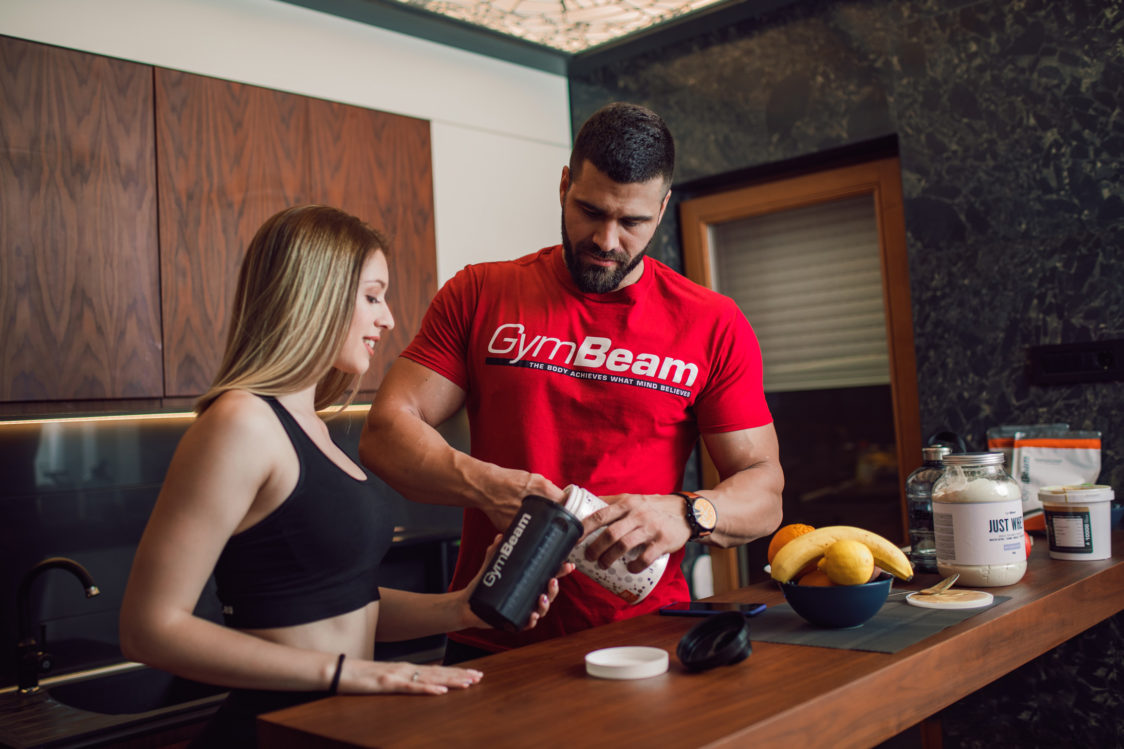
These 15 simple tips will support your body’s defense system
It is definitely not necessary to turn your life 180 ° and try to follow all the tips below to support the immune system. It is a continuous work with the help of small steps, which in the long run can be reflected in reducing the risk of the onset of the disease, improving the function of the immune system or even greater preparedness of the body to fight the disease itself. We simply choose an area of lifestyle that we are able to pay attention to and can easily improve, instead of being more stressed by not being able to 100% follow all the recommendations we would like. Even small steps mean improvements, which over time can become one huge improvement in lifestyle without costing us any major effort.
1. Practice basic hygiene measures and be aware of where the greatest danger lies
If we want to reduce the risk of infection with any infectious disease, it is necessary to practice basic hygiene measures. It is quite clear that we may not be able to avoid all the problematic situations where people in our vicinity forget to cover their mouths when they sneeze or you are being squeezed like sardines stuck in a crowded public transport network. But we can influence a lot of things.
For example, keeping in mind where we are most at risk. These are places with a high concentration of people, especially indoors (shops, shopping centers, means of transport or a workplace with a large number of people and potentially ill people (hospitals, testing collection centers or waiting rooms for doctors)). Being aware of this and behaving with care will minimize the risk of potential infection. According to the WHO, what are the basic hygiene measures? [5]
- Follow the regulations set by the government and the relevant authorities.
- Wash your hands thoroughly regularly. Especially after visiting places with a high concentration of people, such as shops, shopping malls, public transport, and the working environment.
- Avoid touching your nose, eyes, and mouth. The hands touch a lot of objects, so they can be easily temporarily contaminated with pathogens, which, when scratched on the nose, make it easier to enter the body.
- Cover your mouth when coughing and regularly disinfect frequently used objects and areas that are touched by more than one person, such as door handles or displays and phone buttons.
- Avoid places with a high concentration of people, especially indoors.
- Frequently increase airflow supply to closed spaces.
- Do not share personal belongings, snacks, or drinks with other people.
2. Try to reduce the widespread stress with the help of various relaxation techniques
Sure, it is very easy to say that we should reduce all the stressors, but somehow everyone forgets to tell us how we should do it. The lives of most of us are affected by government measures and the current epidemic itself. News from all communication channels spew new record numbers of infected people, gyms and other sports venues are closed and we may be spending too much time at home again. When we add the stress from work, paying the mortgage or helping children with their studies at home, then it is very likely that most of us experience long-term (chronic) stress.
But long-term stress is not exactly our friend. And due to the reduced production of cells of the immune system, it weakens the body’s defenses against disease. It also has a negative impact on our sex lives. It lowers libido, and instead of a “wasted night”, we are more likely to have a thoughtless night with a TV series. [6] [7] [8]
How to manage stress and reduce chronic stress?
- Limit watching the news and engage in activities that make you happy instead. You will not miss out on anything and the essential will always reach you in some form. Simply don’t pay attention to negative issues with which you can’t do anything. Once you decide to read the news, trust quality information sources – national news agencies and large media houses such as CNN or the BBC.
- Try breathing exercises or some form of meditation. Regular practice of meditation is associated with better coping with stressful situations. You can try one of the applications that will guide you through meditation. Today, calm is the most popular.
- Work out indoors or outdoors, try yoga, go jogging or go for a walk in the nature. Sports activity alone can effectively combat stress.
- Keep in touch with your loved ones, talk to them and share your current concerns and problems together. Shared worry is then at least half the worry, and the knowledge that you are not alone in everything will also do its job.
- Do not solve your problems, emotions or bad mood with alcohol and cigarettes. Try to talk to your loved ones about things that bother your soul or seek the help of an experienced psychologist.
- Start your morning with a cold shower and in the evening take a warm shower or bath in the dark, after which you will head straight to the realm of dreams.
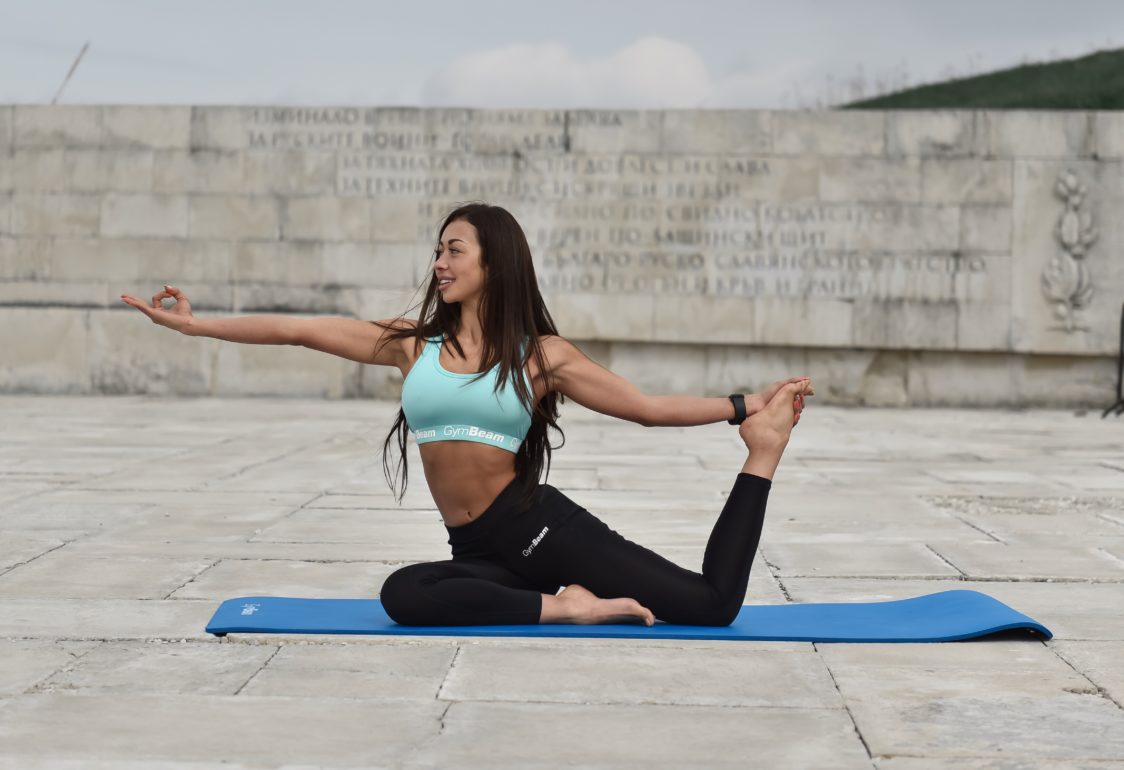
3. Focus on quality sleep that is long enough
Lack of sleep disrupts the optimal functioning of the immune system, thus weakening some of the military’s immune units, making us more susceptible to disease. A study of 22,000 people found that people who slept less than 6 hours a day or had more serious sleep problems were more prone to flu outbreaks and other respiratory infections. [1] [9] [10]
Watching Netflix until late night or playing on a PlayStation is not the best idea how to spend the time intended for sleeping. Due to the overall support of health, sports, and mental performance, we should treat ourselves to a sufficient quality sleep every day for 7-9 hours. [11]
If you are interested in tips for improving sleep, read our article How to improve sleep and how it affects health and muscle growth?
4. Don’t forget to move and exercise regularly
Regular sports activity is closely linked to a more resilient immune system. Nieman & Wentz, (2019) showed that regular moderately demanding sport, which is defined in the intensity of about 60% VO2 max. and lasting 60 minutes, has a beneficial effect on the immune system. People who exercise regularly experience less common flu and viral illnesses. Further studies showed that when participants walked almost every day for 40 minutes at 70-75% VO2 max, they had half less “sick days” (colds, flu or sore throats) compared to people who did not play sports at all. At the same time, regular sports are beneficial for reducing the level of chronic stress. [12] [13] [7]
Therefore, let’s devote at least every second day to regular moderately demanding physical activities enriched with strength training or another favorite activity three times a week. If you are interested in the other benefits of regular exercise, read our article 10 unexpected benefits of workout that will improve your life.
5. Eat the Rainbow alias eat more colorful vegetables, fruits, and foods
I really didn’t go crazy, the concept of calling on people to “eat the rainbow” has a rational basis. We should eat at least 400 grams of vegetables and 200 grams of fruit per day, which is about 3-4, or 2-3 smaller average pieces. What do we gain when our food will have all the colors of the rainbow? Red, orange, yellow, green and blue-violet fruits and vegetables will please our body with a number of biologically active substances with a wide beneficial effect on our health. Thanks to the fiber contained, we will also please our microbiome (intestinal bacteria). Fiber supports its proper function, which is also important for the immune system. [14]
To each meal, have a piece of your favorite fruit or vegetable and try to make the colors of your all-day meal resemble an Instagram hit in the form of “Poke bowls” or colored oatmeal. If you are interested to learn more information about colored foods, you can find them in our article Superfoods and their effects on health and immunity.
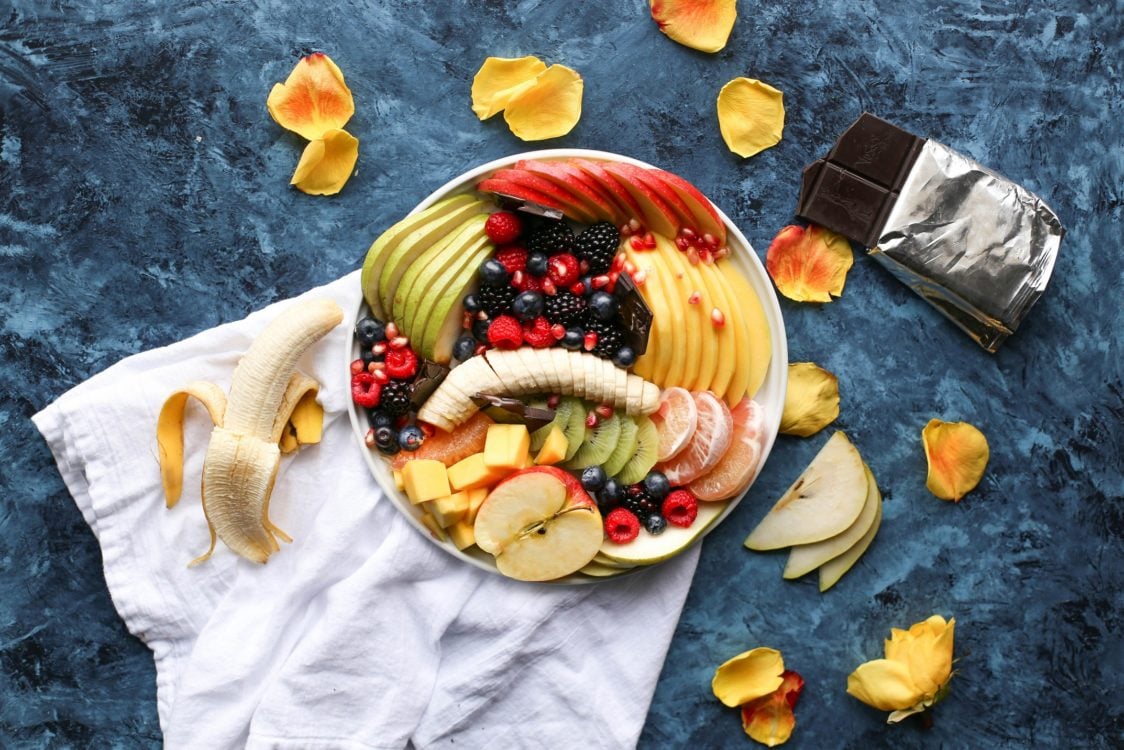
6. Eat more probiotic and prebiotic foods and give probiotics a chance
Kefir, quality yoghurt, acidophilic milk, fermented vegetables, kimchi, fruits, vegetables, legumes, whole grains, or kombucha, for example, have a positive effect on our microbiome, about 350 trillion microbial cells located in our digestive tract, especially the large intestine. And if we properly feed our microbiome with fiber and “living foods” that naturally contain healthy bacteria, they will also repay us by supporting the immune system. Some bacteria even “produce vitamins, especially B-group vitamins,” and help our immunity in this way. [15] [16] [19]
In the diet, choose mainly sour milk products, fermented vegetables, and foods with sufficient fiber content. We can also support the optimal function of our miniature “roommates” with quality probiotics, which are a concentrated source of probiotic cultures supporting the optimal composition of the microbiome. If you want to learn more about probiotics, read our article Probiotics: Probiotics: The importance of beneficial bacteria for the immunity and general health of athletes.
You might be interested in these products:
7. Ensure a sufficient protein intake
Protein is the cornerstone for the formation of cells of the immune system, our “defense army.” Thanks to the optimal intake of protein, the body has enough building materials to create “new soldiers” and defeat the disease. It is therefore necessary to maintain protein intake with respect to our goals and sports load, which for strength athletes can fall in the range of 1.4-2 g per kilogram of body weight. [17] [18]
Focus on quality sources of protein: meat, fish, seafood, milk, dairy products and cheese, eggs, legumes (peas, beans, all kinds of lentils, chickpeas, edamame), pseudo-cereals (buckwheat, amaranth, quinoa), tofu, tempeh , nuts and seeds, plant meat substitutes, delicatessen yeast, whey protein, plant-based protein, protein bars. If you are looking for inspiration for other protein-rich foods, you will find them in our article 20 foods with which you can easily add protein to your diet.
8. Eat more healthy fats
Consumption of healthy fats (such as omega 3 fatty acids) instead of saturated fatty acids can help the body produce substances that are involved in the regulation of immune functions. Omega 3 fatty acids have anti-inflammatory effects as well as healthy fats from extra virgin olive oil, which can help the body fight the disease. [20] [21]
At least partially replace the red meat and sausages with sea fish, add chia seeds to the oatmeal and extra virgin olive oil to the vegetable salad. Dietary supplements with their content are also a suitable way to increase the consumption of omega 3 fatty acids. To learn more about the types and distribution of fats, read our article Fats, which are bad and which are good?
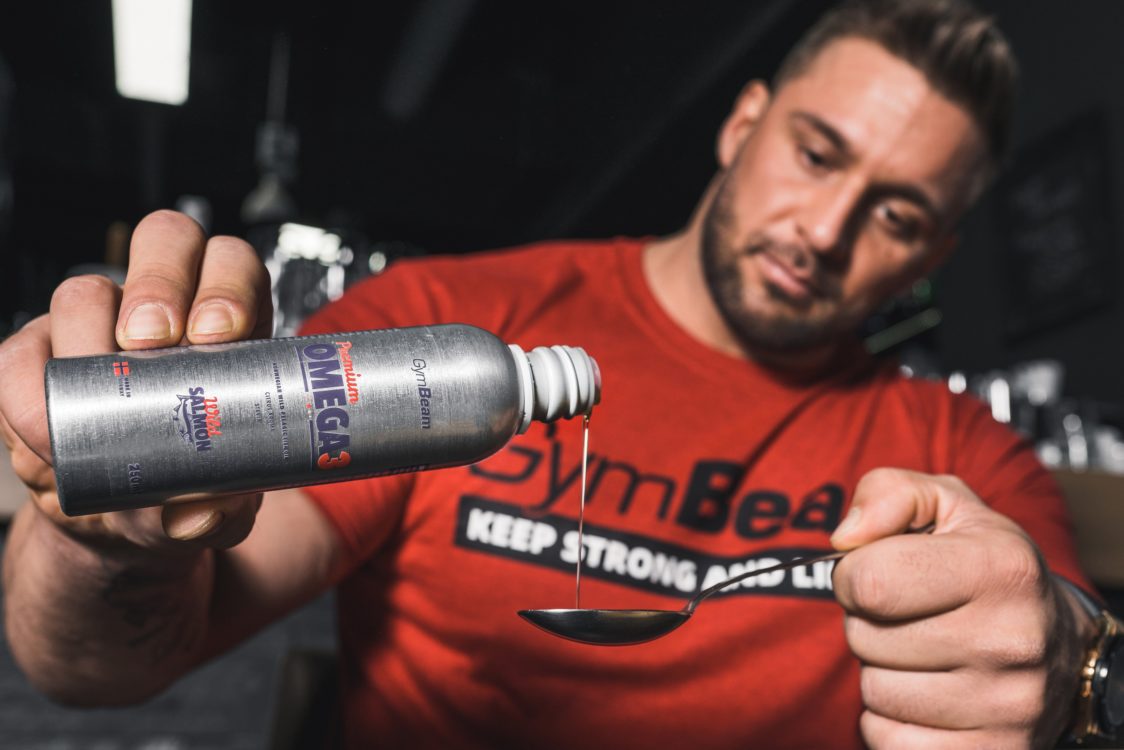
9. Give a chance to a regular sauna
Regular sauna strengthens the immune system and can act as a prevention against flu and colds. The higher temperature in saunas is also due to the higher temperature of the body, which leads to an increase in the “part of the immune army” in the form of white blood cells. [22] [23]
If possible and the sauna is comfortable for you, visit the sauna regularly about 1-2 times a week.
10. Take cold showers. The cold shower in the morning will pleasantly kick start you for the coming day
Not only the high temperature in the sauna is beneficial for our body. The effects of cold and cold showers are similar. Regular cold showers can reduce the level of the stress hormone cortisol, which in itself benefits us and can help us cope better with the effects of long-term stress. Like regular saunas, cold showers can also increase the number of certain “immune army troops” in the form of white blood cells and monocytes, for example. As a result, our immune system is more resilient and better armed to fight infection. [24] [25]
How to start with cold showers? It is not necessary to throw everything out of the freezer, make as much ice as possible, throw it in the bathtub and be in the ice up to your neck like the legendary ice man Wim Hof. After a warm morning shower, it is enough to lower the water temperature in small steps until we reach the cold water and hold on for as long as possible. At first it can be quite challenging, and we will feel like on the road to hell, but over time we will get used to it and we will be much better prepared for a demanding day.
11. Reduce alcohol consumption and the number of cigarettes smoked
Evening alcohol consumption impairs the quality of sleep (especially REM), which can undermine our feet in the way of the strongest possible immune system. Due to the diuretic effect of alcohol and more frequent night trips to the toilet, the impairment of sleep quality is even more significant. Excessive alcohol consumption is associated with a weaker immune system and a longer time to recover from the disease. Similar applies to smoking with which we voluntarily release a number of toxins into our bodies. These can have a negative effect on the growth and function of “immune army” cells in the form of cytokines or B lymphocytes. [26] [27]
If possible, keep your drinking under control and do not exceed the maximum daily alcohol intake of 20 grams for men and 10 grams for women. It’s the same with smoking. Ideal is not to smoke and try to quit.
- 10 grams of alcohol is about 125 ml of wine, 0.3 l of beer or 40 ml of hard liquor
- 20 grams of alcohol is about 250 ml of wine, 0.5 l of beer or 60 ml of hard liquor
Are you wondering what effect alcohol has not only on your health but also on your body form? You will find out everything after you read our article How does alcohol affect weight loss, muscle regeneration and growth?
12. Limit your intake of poor-quality food and focus on fresh and minimally processed food
We could talk about the importance of nutrition over and over again in connection with any topic that concerns the improvement of lifestyle. This is due to the fact that nutrition is really so important and plays a key role in the issue of optimal defense system of the body. A poor-quality diet with a predominance of highly industrially processed foods, led by fast food, sweets, savory delicacies, fried foods, and sausages, is poor in micronutrients, which our body needs for its function. On the contrary, it contains a number of substances that have a negative effect on our health. No one benefits from a high intake of salt, saturated, omega 6 and trans fatty acids or refined carbohydrates.
By improving the diet thanks to more vegetables, fruits, whole grains, legumes, foods with probiotic and prebiotic effects, quality proteins and healthy fats, we will support the optimal function of the immune system by giving it everything it needs to function. We can insure the intake of micronutrients with multivitamin and multimineral formula.
At the same time, we need to receive as much energy as we really need. High or too low % of body fat also affects immune function. Therefore, it is necessary to maintain a healthy body weight. To find out how much energy you should eat and how to easily create a diet, read our article How to calculate the intake of energy and macronutrient for weight loss or muscle gain?
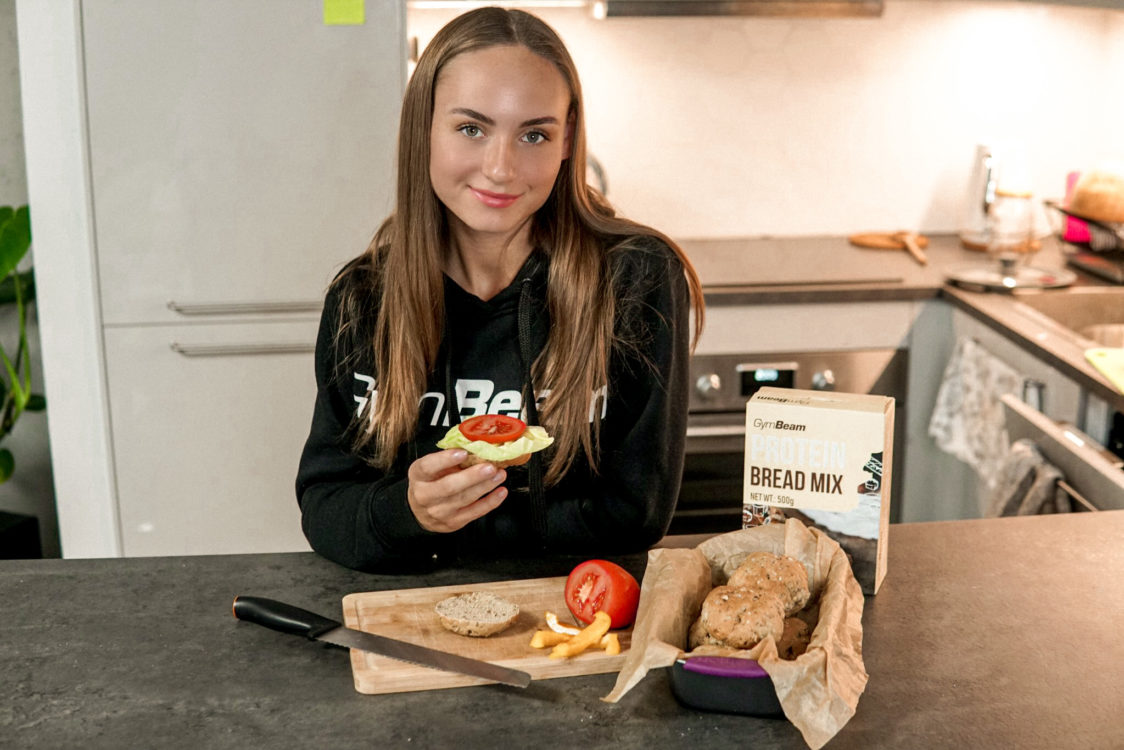
13. Reach for quality supplements
For a strong immune system, it is necessary to build on solid foundations in the form of a quality diet. Some nutrients have a positive effect on white blood cells and their ability to fight infection. Which are they?
- Protein is a building block for the production of white blood cells and their sufficient intake is really important for our defense system. In addition to traditional sources, we can also supplement proteins with high-quality whey protein containing biologically active protein fractions, which are beneficial for our immunity. These are immunoglobulins, alpha and beta-lactoglobulin or lactoferrin. [29]
- Vitamin C is an important antioxidant that has a direct effect on the immune system, and its deficiency makes us more susceptible to disease. Its good sources include vegetables headed with red peppers or fruits represented by oranges. We can also “insure” its intake with a nutritional supplement.
- Vitamin D and its deficiency has been a widely discussed topic recently. Its supplementation in the winter months has proven to be an effective tool for reducing the incidence of influenza. In one study, this effect was seen in school children at a daily dose of 1,200 IU of vitamin D. Vitamin D is relatively deficient in the diet and we “produce” it ourselves using UVB radiation from the sun falling on our skin, which is not much from autumn to spring. Vitamin D supplementation appears to be an ideal tool for achieving its optimal values. [30]
- Zinc is another indispensable element for the proper functioning of the immune system. We can find it mainly in whole grain cereals, offal, beef, oysters or beans or cashew nuts.
- Omega 3 fatty acids fight inflammation and help white blood cells do their job of eliminating pathogens. We can find them in fatty sea fish, chia and flax seeds or walnuts. Unless we eat fish 2-3 times a week, it is time to consider omega-3 supplementation.
- Probiotics are a source of “friendly bacteria” that help our microbiome perform their function and support our natural defense system. Reach after sour dairy products, fermented vegetables, fruits, vegetables, nuts, legumes, whole grains, and a supplement in the form of probiotics, which is a concentrated source of these friendly bacteria. Such oatmeal with protein, favorite fruit and yogurt is a source of probiotic and prebiotic foods.
- Multivitamin and multimineral can help us meet the recommended daily intake of micronutrients. They are involved in a series of chemical reactions in our bodies, without which the immune system would not function properly.
During the day, it is nice to drink ginger tea, add onions, garlic, chili to meals and warm oneself up with an honest warm soup that has an anti-inflammatory effect. We can also support the body’s defense system with Echinacea, which reduces the chances of getting the flu. [31]
If you are interested in more supplements to fight the flu and colds, read our article Which supplements can help you with the flu and cold?
14. Stay active and go for walks into nature
While in most countries the intervals of permitting and banning gyms alternate, nature offers us such an outdoor universal gym. We can go jogging, cycling, walking, or exercising outside, for example, a circuit workout with your own body weight. External activity is important for our physical as well as mental health. Every step counts and is more beneficial than sitting on the couch. Staying in nature is also associated with a positive effect on our mental health. One study showed that when people live in cities within 300 meters of urban greenery, for example in the form of a park, they are happier and generally more satisfied. [32]
If you are interested to find out more about outdoor trainings, read our article Outdoor training – why and how to start exercising in the fresh air.

15. Laugh a lot, be positive and stay in touch with your loved ones
Studies suggest that a sense of humor and laughter can have a positive effect on the immune system. However, the authors cautiously add that further research is needed to confirm this possible relation. Even if this is not true, it does not change the fact that laughter is the spice of life, thanks to which our life is happier, more positive, and less stressed. When we have someone to call with, the feeling of separation is reduced, and the shared problem becomes halved. Man is a social creature and isolation does him no good, so it’s nice to have someone to talk to. It may be time to summon a large family, childhood, or high school friends, and strengthen the time-wane friendship. [33]
What should we get out of it?
We best support the immune system and the natural defenses of our body with a healthy lifestyle and adherence to basic hygiene measures. Restrictions on tracking negative news and events that can put long-term stress on us in the long run can help us significantly. When we learn techniques for mastering it, such as any sports activity, stay in nature, meditation, yoga, sauna, or cold showers, then everything can suddenly seem a bit easier and happier.
We don’t have to turn our lives upside down and start living completely differently. It is enough to work slowly and continuously to improve eating habits and a positive approach to life. A good start can be a piece of fruit or vegetable with each meal. And let’s not forget that there is no such thing as a miraculous kick start of the immunity from a specific food. It’s all about a strong “immune army.”
Do you have any personal tips to support immunity? Feel free to share it with us in the comments. If you liked the article and it was useful for you, support it by sharing it so that these simple tips for strengthening immunity can be learned by your friends and will be useful for them as well.
[1] Ganz, F. D. – Sleep and Immune Function – https://doi.org/10.4037/ccn2012689
[2] Wagner, D. N., Marcon, A. R., & Caulfield, T. – “Immune Boosting” in the time of COVID: Selling immunity on Instagram – https://doi.org/10.1186/s13223-020-00474-6
[3] Nicholson, L. B. – The immune system – https://doi.org/10.1042/EBC20160017
[4] Chaplin, D. D. – Overview of the Immune Response. – https://doi.org/10.1016/j.jaci.2009.12.980
[5] WHO – Advice for the public on COVID-19 – https://www.who.int/emergencies/diseases/novel-coronavirus-2019/advice-for-public
[6] Cohen, S., Janicki-Deverts, D., Doyle, W. J., Miller, G. E., Frank, E., Rabin, B. S., & Turner, R. B. – Chronic stress, glucocorticoid receptor resistance, inflammation, and disease risk. P – https://doi.org/10.1073/pnas.1118355109
[7] Segerstrom, S. C., & Miller, G. E. – Psychological Stress and the Human Immune System: A Meta-Analytic Study of 30 Years of Inquiry – https://doi.org/10.1037/0033-2909.130.4.601
[8] Dhabhar, F. S. – Effects of stress on immune function: The good, the bad, and the beautiful – https://doi.org/10.1007/s12026-014-8517-0
[9] Faraut, B., Boudjeltia, K. Z., Vanhamme, L., & Kerkhofs, M. – Immune, inflammatory and cardiovascular consequences of sleep restriction and recovery – https://doi.org/10.1016/j.smrv.2011.05.001
[10] Prather, A. A., & Leung, C. W. – Association of Insufficient Sleep With Respiratory Infection Among Adults in the United States – https://doi.org/10.1001/jamainternmed.2016.0787
[11] Hirshkowitz, M., Whiton, K., Albert, S. M., Alessi, C., Bruni, O., DonCarlos, L., Hazen, N., Herman, J., Katz, E. S., Kheirandish-Gozal, L., Neubauer, D. N., O’Donnell, A. E., Ohayon, M., Peever, J., Rawding, R., Sachdeva, R. C., Setters, B., Vitiello, M. V., Ware, J. C., & Adams Hillard, P. J. – National Sleep Foundation’s sleep time duration recommendations: Methodology and results summary – https://doi.org/10.1016/j.sleh.2014.12.010
[12] Nieman, D. C., & Wentz, L. M. – The compelling link between physical activity and the body’s defense system – https://doi.org/10.1016/j.jshs.2018.09.009
[13] Sreenath S. – Exercise and immune system – https://www.kheljournal.com/archives/2017/vol4issue1/PartD/4-1-3-279.pdf
[14] Elsen, L. W. van den, Poyntz, H. C., Weyrich, L. S., Young, W., & Forbes‐Blom, E. E. – Embracing the gut microbiota: The new frontier for inflammatory and infectious diseases – https://doi.org/10.1038/cti.2016.91
[15] Althani, A. A., Marei, H. E., Hamdi, W. S., Nasrallah, G. K., Zowalaty, E., E, M., Al Khodor, S., Al‐Asmakh, M., Abdel‐Aziz, H., & Cenciarelli, C. – Human Microbiome and its Association With Health and Diseases – https://doi.org/10.1002/jcp.25284
[16] Rowland, I., Gibson, G., Heinken, A., Scott, K., Swann, J., Thiele, I., & Tuohy, K. – Gut microbiota functions: Metabolism of nutrients and other food components. – https://doi.org/10.1007/s00394-017-1445-8
[17] Ralf Jäger, Kerksick, C. M., Campbell, B. I., Cribb, P. J., Wells, S. D., Skwiat, T. M., Purpura, M., Ziegenfuss, T. N., Ferrando, A. A., Arent, S. M., Smith-Ryan, A. E., Stout, J. R., Arciero, P. J., Ormsbee, M. J., Taylor, L. W., Wilborn, C. D., Kalman, D. S., Kreider, R. B., Willoughby, D. S., … Antonio, J. – International Society of Sports Nutrition Position Stand: Protein and exercise – https://doi.org/10.1186/s12970-017-0177-8
[18] Kurpad, A. V. – The requirements of protein & amino acid during acute & chronic infections – https://pubmed.ncbi.nlm.nih.gov/17015927/
[19] Jäger, R., Mohr, A. E., Carpenter, K. C., Kerksick, C. M., Purpura, M., Moussa, A., Townsend, J. R., Lamprecht, M., West, N. P., Black, K., Gleeson, M., Pyne, D. B., Wells, S. D., Arent, S. M., Smith-Ryan, A. E., Kreider, R. B., Campbell, B. I., Bannock, L., Scheiman, J., … Antonio, J. – International Society of Sports Nutrition Position Stand: Probiotics. – https://doi.org/10.1186/s12970-019-0329-0
[20] Kiecolt-Glaser, J. K., Glaser, R., & Christian, L. M. – Omega-3 Fatty Acids and Stress-Induced Immune Dysregulation: Implications for Wound Healing – https://doi.org/10.7205/MILMED-D-14-00167
[21] Piroddi, M., Albini, A., Fabiani, R., Giovannelli, L., Luceri, C., Natella, F., Rosignoli, P., Rossi, T., Taticchi, A., Servili, M., & Galli, F. – Nutrigenomics of extra-virgin olive oil: A review. – https://doi.org/10.1002/biof.1318
[22] Laukkanen, J. A., Laukkanen, T., & Kunutsor, S. K. – Cardiovascular and Other Health Benefits of Sauna Bathing: A Review of the Evidence. – https://doi.org/10.1016/j.mayocp.2018.04.008
[23] Pilch, W., Pokora, I., Szyguła, Z., Pałka, T., Pilch, P., Cisoń, T., Malik, L., & Wiecha, S. – Effect of a Single Finnish Sauna Session on White Blood Cell Profile and Cortisol Levels in Athletes and Non-Athletes. – https://doi.org/10.2478/hukin-2013-0075
[24] Leppäluoto, J., Westerlund, T., Huttunen, P., Oksa, J., Smolander, J., Dugué, B., & Mikkelsson, M. – Effects of long‐term whole‐body cold exposures on plasma concentrations of ACTH, beta‐endorphin, cortisol, catecholamines and cytokines in healthy females. – https://doi.org/10.1080/00365510701516350
[25] Manolis, A., Manolis, S., Manolis, A., Manolis, T., Apostolaki, N., & Melita, H. – Winter Swimming: Body Hardening and Cardiorespiratory Protection Via Sustainable Acclimation. – https://doi.org/10.1249/JSR.0000000000000653
[26] Sarkar, D., Jung, M. K., & Wang, H. J. – Alcohol and the Immune System. Alcohol Research : Current Reviews – https://www.ncbi.nlm.nih.gov/pmc/articles/PMC4590612/
[27] Qiu, F., Liang, C.-L., Liu, H., Zeng, Y.-Q., Hou, S., Huang, S., Lai, X., & Dai, Z. – Impacts of cigarette smoking on immune responsiveness: Up and down or upside down? – https://doi.org/10.18632/oncotarget.13613
[28] Federico, A., D’Aiuto, E., Borriello, F., Barra, G., Gravina, A. G., Romano, M., & De Palma, R. – Fat: A matter of disturbance for the immune system – https://doi.org/10.3748/wjg.v16.i38.4762
[29] Beaulieu, J., Dupont, C., & Lemieux, P. – Whey proteins and peptides: Beneficial effects on immune health – https://doi.org/10.2217/14750708.3.1.69
[30] Urashima, M., Segawa, T., Okazaki, M., Kurihara, M., Wada, Y., & Ida, H. – Randomized trial of vitamin D supplementation to prevent seasonal influenza A in schoolchildren. – https://doi.org/10.3945/ajcn.2009.29094
[31] National Center for Complementary and Integrative – Health Echinacea – https://www.nccih.nih.gov/health/echinacea
[32] Neuroscience News – Green space is good for your mental health: The nearer the better! – https://neurosciencenews.com/green-space-mental-health-14757/
[33] Bennett, M. P., & Lengacher, C. – Humor and Laughter May Influence Health IV. Humor and Immune Function – https://doi.org/10.1093/ecam/nem149

Add a comment
You must be logged in to post a comment.